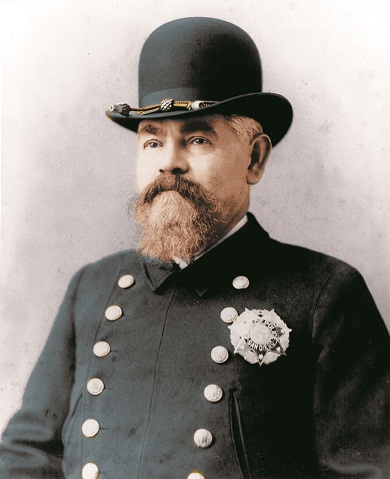
CITY MARSHAL JOSEPH COYNE 12/1885 - 05/08/1889
SDPD CHIEF OF POLICE 05/09/1889 - 05/28/1891
12/18/1837 - 02/05/1916
Joseph Coyne was born in Cleveland Ohio on December 18, 1837. He was only three years old when his father Patrick died leaving his mother Ann as the head of the family.
At age fifteen, Coyne came west and found work as a miner in Northern California. It would be his career for a number of years until after the Civil War. Coyne was apparently a fairly lucky miner as he made a number of fortunes but that’s as far as his luck went. He also enjoyed a good card game and wasn’t so lucky there. Consequently, most of the money he made he also lost.
In 1870 Coyne arrived in San Diego County where he found work in the gold mines of the mountain town of Julian.
It was there he probably had his first encounter with some of the lawlessness in the area. Several pieces of gold came up missing from the camp. When Coyne and several other miners went to look for it, they found themselves shot at by the thieves who had made camp in the hills nearby. One shot came so close to Coyne it actually took his hat right off his head. He wasn’t hurt but one of his fellow miners took a gunshot to the face.
The man later recovered. The men never found the missing gold.
The bandits were just a small negative part of Coyne’s mining experiences in Julian. After enjoying several good years in the small mountain community, he sold his share of the operation for $50,000 and moved 60 miles west to San Diego where he was elected sheriff in 1876. His election made him the first Republican to ever serve as county sheriff in the then partisan office and he served three two-year terms.
Coyne he took the role of lawman very seriously and led many hunts into the backcountry to seek out fugitives with his deputy, Ned Bushyhead who would also later serve as both Sheriff and Chief of Police. In 1885 Coyne was appointed City Marshal for San Diego. He was allotted 24 deputies and an assistant. In 1887 he was re-elected, this time under the title of Chief of Police. This despite the City Marshals office was not a municipal police agency.
Coyne’s hiring was on May 14, 1889, with his certificate of election filed on May 16th, officially making him the first member of the SDPD. As chief his first official act would be to sit in on the hiring of the men who would become the new police force. Even though budgetary issues would only allow 12 men to be hired as San Diego police officers, more than 100 outsiders and all the soon to be former deputy marshals applied for the jobs. The competition was fierce.
Officially political affiliation made little difference in getting hired, however out of the 12 officers hired, 8 were Republicans and 4 were Democrats. As with the lawmen previous, these new officers had no formal training.
As the hands on manager of a small department, Coyne was able to monitor firsthand the work his officers were doing. His only real trouble came when he attended a council meeting and became involved in a fistfight with a citizen who stood up and criticized the police department.
Coyne served as chief until May 27, 1891, when, on a 3-1 vote, the police commission elected William H. Crawford as his replacement. (One vote was cast for someone else) Now out of a job, Coyne was forced to hand over the department he helped create to someone else.
In 1893 Coyne took a job as a deputy under Sheriff Ben Hill and was soon thereafter appointed a night watchman in the county courthouse. The job only lasted a year before he retired and moved his family to San Francisco. After a three-year illness, Coyne died of a heart attack in San Francisco on February 5, 1916, at the age of 78.
In 1989, one hundred years after Coyne took office, his granddaughter, Laura McGowan - Minto, became a San Diego police officer.
THE THIN BLUE LINE


Basic information is provided as a courtesy and is obtained from a variety of sources including public data, museum files and or other mediums. While the San Diego Police Historical Association strives for accuracy, there can be issues beyond our control which renders us unable to attest to the veracity of what is presented. More specific information may be available if research is conducted. Research is done at a cost of $50 per hour with no assurances of the outcome. For additional info please contact us.